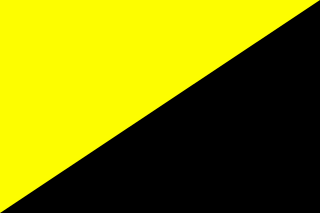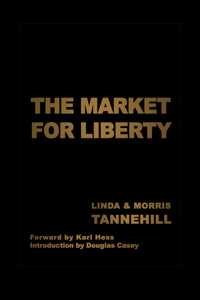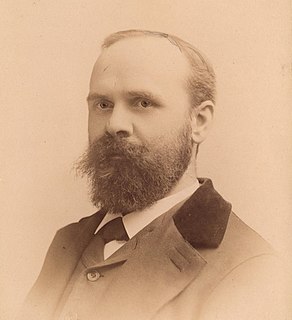
Anarcho-capitalism is an anti-statist libertarian political philosophy and economic theory that seeks to abolish centralized states in favor of stateless societies with systems of private property enforced by private agencies, the non-aggression principle, free markets and the right-libertarian interpretation of self-ownership, which extends the concept to include control of private property as part of the self. In the absence of statute, anarcho-capitalists hold that society tends to contractually self-regulate and civilize through participation in the free market which they describe as a voluntary society. In a theoretical anarcho-capitalist society, the system of private property would still exist and be enforced by private defense agencies and/or insurance companies selected by customers which would operate competitively in a market and fulfill the roles of courts and the police.

The Machinery of Freedom is a nonfiction book by David D. Friedman that advocates an anarcho-capitalist society from a consequentialist perspective.
Libertarians have differing opinions on the validity of intellectual property.
Libertarian theories of law build upon classical liberal and individualist doctrines.

Randy Evan Barnett is an American legal scholar and lawyer. He serves as the Patrick Hotung Professor of Constitutional Law at Georgetown University, where he teaches constitutional law and contracts, and is the director of the Georgetown Center for the Constitution. After graduating from Northwestern University and Harvard Law School, he tried many felony cases as a prosecutor in the Cook County States’ Attorney's Office in Chicago. A recipient of a Guggenheim Fellowship in Constitutional Studies and the Bradley Prize, Barnett has been a visiting professor at Penn, Northwestern and Harvard Law School.
Natural rights and legal rights are two types of rights.

A night-watchman state, or minarchy, whose proponents are known as minarchists, is a model of a state that is limited and minimal, whose functions depend on libertarian theory. Right-libertarians support it only as an enforcer of the non-aggression principle by providing citizens with the military, the police, and courts, thereby protecting them from aggression, theft, breach of contract, fraud, and enforcing property laws.
The nature of capitalism is criticized by left-wing anarchists, who reject hierarchy and advocate stateless societies based on non-hierarchical voluntary associations. Anarchism is generally defined as the libertarian philosophy which holds the state to be undesirable, unnecessary and harmful as well as opposing authoritarianism, illegitimate authority and hierarchical organization in the conduct of human relations. Capitalism is generally considered by scholars to be an economic system that includes private ownership of the means of production, creation of goods or services for profit or income, the accumulation of capital, competitive markets, voluntary exchange and wage labor which has generally been opposed by anarchists historically. Since capitalism is variously defined by sources and there is no general consensus among scholars on the definition nor on how the term should be used as a historical category, the designation is applied to a variety of historical cases, varying in time, geography, politics and culture.
Criticism of libertarianism includes ethical, economic, environmental and pragmatic concerns and is often focused on right-libertarianism. Critics have argued that laissez-faire capitalism does not necessarily produce the best or most efficient outcome, and that libertarianism's philosophy of individualism and policies of deregulation fail to prevent the abuse of natural resources. Criticism of left-libertarianism is instead mainly related to anarchism and includes allegations of utopianism, tacit authoritarianism and vandalism towards feats of civilization. Left and right-libertarians also engage in criticism of each other.
Polycentric law is a theoretical legal structure in which "providers" of legal systems compete or overlap in a given jurisdiction, as opposed to monopolistic statutory law according to which there is a sole provider of law for each jurisdiction. Devolution of this monopoly occurs by the principle of jurisprudence in which they rule according to higher law.
The non-aggression principle (NAP), also called the non-aggression axiom, is a concept in which aggression, defined as initiating or threatening any forceful interference against either an individual, their property or against promises (contracts) for which the aggressor is liable and in which the individual is a counterparty, is inherently wrong. There is no single or universal interpretation or definition of the NAP, with different definitions varying in regards to how to treat intellectual property, force, abortion, and other topics.
Left-libertarianism, also known as egalitarian libertarianism, left-wing libertarianism or social libertarianism, is a political philosophy and type of libertarianism that stresses both individual freedom and social equality. Left-libertarianism represents several related yet distinct approaches to political and social theory. In its classical usage, it refers to anti-authoritarian varieties of left-wing politics such as anarchism, especially social anarchism, whose adherents simply call it libertarianism, communalism, and libertarian Marxism, which are collectively termed libertarian socialism. A portion of the left-wing of the green movement, including adherents of Murray Bookchin's social ecology, are also generally considered left-libertarian.
Right-libertarianism, also known as libertarian capitalism or right-wing libertarianism, is a libertarian political philosophy that supports capitalist property rights and defends market distribution of natural resources and private property. The term right-libertarianism is used to distinguish this class of views on the nature of property and capital from left-libertarianism, a type of libertarianism that combines self-ownership with an egalitarian approach to natural resources. In contrast to socialist libertarianism, right-libertarianism supports free-market capitalism. Like most forms of libertarianism, it supports civil liberties, especially natural law, negative rights, the non-aggression principle, and a major reversal of the modern welfare state.

The Market for Liberty is an anarcho-capitalist book written by Linda and Morris Tannehill, which according to Karl Hess has become "something of a classic." It was preceded by the self-published Liberty via the Market in 1969. Mary Ruwart credits the Tannehill's book with winning her over to anarcho-capitalism. Doug Casey was also converted to anarcho-capitalism after reading the book at the behest of Jarret Wollstein. According to the Ludwig von Mises Institute, it was written just following a period of intense study of the writings of both Ayn Rand and Murray Rothbard. It was the first significant anarcho-capitalist work to hit the libertarian movement, coming into print a year before Rothbard's Power and Market although Rothbard's book had been written earlier.
A private defense agency (PDA) is a theoretical enterprise which would provide personal protection and military defense services to individuals who would pay for its services. PDAs are advocated in anarcho-capitalism as a way of enforcing the system of private property.
Libertarianism is variously defined by sources as there is no general consensus among scholars on the definition nor on how one should use the term as a historical category. Scholars generally agree that libertarianism refers to the group of political philosophies which emphasize freedom, individual liberty and voluntary association. Libertarians generally advocate a society with little or no government power.
Consequentialist libertarianism, also known as consequentialist liberalism or libertarian consequentialism, is a libertarian political philosophy and position that is supportive of a free market and strong private property rights only on the grounds that they bring about favorable consequences such as prosperity or efficiency.

The position that taxation is theft, and therefore immoral, is found in a number of political philosophies considered radical. It marks a significant departure from conservatism and classical liberalism. This position is often held by anarcho-capitalists, objectivists, most minarchists, right-wing libertarians, and voluntaryists.
The following outline is provided as an overview of and topical guide to libertarianism, a political philosophy that upholds liberty as its principal objective. As a result, libertarians seek to maximize autonomy and freedom of choice, emphasizing political freedom, voluntary association and the primacy of individual judgment.

Benjamin Ricketson Tucker was an American free-market individualist anarchist and libertarian socialist. Tucker was the editor and publisher of the American individualist anarchist periodical Liberty (1881–1908). Tucker was a member of the socialist First International, while describing his form of anarchism as "consistent Manchesterism" and stated that "the Anarchists are simply unterrified Jeffersonian Democrats."







